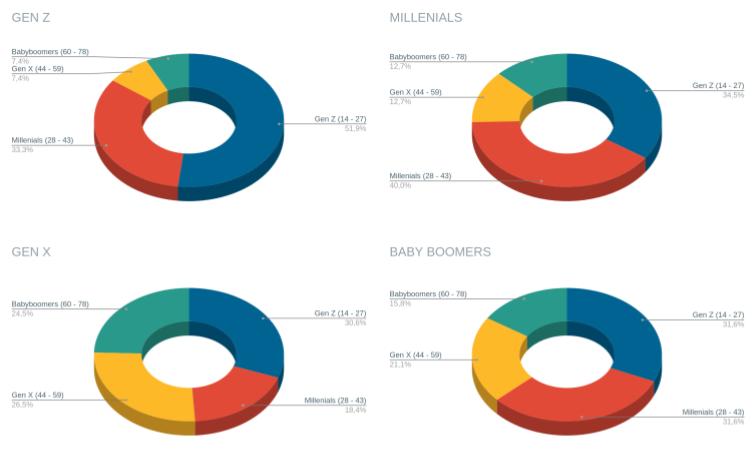45. The person who was the target of the sentence belongs to which generation?

This question aims to explore respondents’ perceptions regarding which generation, based on their experience, is most frequently the target of discriminatory remarks or behaviors.
Each generation tends to see itself (or those closest in age) as the target of discrimination, showing a personal perception of vulnerability to the phenomenon.
- Gen Z and Millennials predominantly see themselves—and to some extent, each other—as the main recipients of discriminatory words or actions.
- Gen X recognize themselves as victims, but also frequently mention younger generations.
- Baby Boomers perceive discrimination mainly towards themselves and Gen X.
In general, older generations are rarely considered victims by younger ones, whereas they tend to feel discriminated against particularly in organizational and technological change contexts.
This analysis confirms that the perception of being a discrimination target is cross-generational, but each cohort tends to attribute greater vulnerability to their own experience.
Gen Z Answers
- The majority of Gen Z respondents identify their own generation (Gen Z) as the most frequent targets of discriminatory statements.
- It is rare for them to indicate Millennials, Gen X, or Baby Boomers as main victims.
- This perception likely reflects a specific sensitivity among young people towards discrimination directed at new ways of being and working, or to less advantageous power dynamics for those just starting their careers.
Millennials’ Answers
- Millennials also most often identify their own generation as the primary target of discriminatory remarks or behaviors.
- There is also a notable presence of responses mentioning Gen Z as targets, while Gen X and Baby Boomers are mentioned much less frequently.
- This highlights the perception of greater exposure for younger generations, perhaps due to cultural or workplace changes.
Gen X Answers
- Gen X provides a more balanced distribution but still tends to see their own cohort as one of the main victims.
- Millennials and Gen Z are also recognized as targets, albeit less frequently, while Baby Boomers are rarely seen as victims.
- This self-perception of vulnerability may be related to their role as a bridge generation, facing pressures from both senior and junior groups.
Baby Boomers’ Answers
- Baby Boomers most often identify themselves and Gen X as the generations most frequently targeted by discriminatory remarks.
- It is rare for them to indicate Millennials or Gen Z as primary victims.
- Among older respondents, there is a recognition of experiencing exclusion, especially in the context of innovation, digitalization, or changing roles.
This post is also available in: German Italian Polish Portuguese (Portugal)







